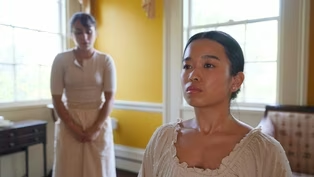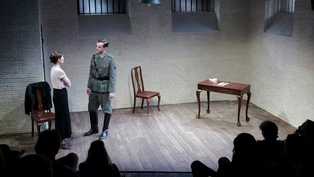State of the Arts
Stanley Clarke: The Trajectory of Jazz
Clip: Season 44 Episode 1 | 8m 14sVideo has Closed Captions
Legendary bassist Stanley Clarke and his band dazzle an audience on the Camden waterfront.
Legendary musician Stanley Clarke revolutionized the bass in the 1970s and has been dazzling audiences ever since; Stanley tells us that he is always open to experimentation. In this performance, the Stanley Clarke Band blends his decades of experience with the energy of rising young stars, electrifying the crowd during a powerful performance at the Camden County Sunset Jazz Series.
Problems playing video? | Closed Captioning Feedback
Problems playing video? | Closed Captioning Feedback
State of the Arts is a local public television program presented by NJ PBS
State of the Arts
Stanley Clarke: The Trajectory of Jazz
Clip: Season 44 Episode 1 | 8m 14sVideo has Closed Captions
Legendary musician Stanley Clarke revolutionized the bass in the 1970s and has been dazzling audiences ever since; Stanley tells us that he is always open to experimentation. In this performance, the Stanley Clarke Band blends his decades of experience with the energy of rising young stars, electrifying the crowd during a powerful performance at the Camden County Sunset Jazz Series.
Problems playing video? | Closed Captioning Feedback
How to Watch State of the Arts
State of the Arts is available to stream on pbs.org and the free PBS App, available on iPhone, Apple TV, Android TV, Android smartphones, Amazon Fire TV, Amazon Fire Tablet, Roku, Samsung Smart TV, and Vizio.
Providing Support for PBS.org
Learn Moreabout PBS online sponsorship[ Music plays ] [ Music plays ] Clarke: It always feels good coming back to Camden.
I mean, I grew up in Philadelphia, and, yeah, it's always nice to come back here.
This place, especially.
I like it because it's got an open air feel, obviously.
And it's a beautiful, beautiful scenery.
It's nice to play here.
[ Music plays ] Narrator: When a young Stanley Clarke left Philadelphia to play jazz gigs in New York, little did he know he was starting a journey that would revolutionize the electric bass.
Over his 50 year career, Stanley has won four Grammy Awards, playing both acoustic and electric bass in multiple bands and genres, as well as recording his own compositions.
He's still going strong, touring as The Stanley Clarke Band with a rotating crew of much younger musicians.
Clarke: Working with younger musicians is extremely important to me because that's kind of what happened with me.
When I came on the scene, 18, 19 was playing with Horace Silver, Art Blakey, Stan Getz.
Those guys were at least 15 years older than me.
And they were really, really, really nice to me.
Narrator: Moving to New York connected Stanley to jazz greats who became his mentors.
But he met contemporary innovators as well.
Working with Chick Corea laid the groundwork for their breakthrough jazz fusion band, Return to Forever, and a lifelong friendship.
Clarke: I was interested in being a composer.
That's why me and Chick gelled so well because he's a composer.
He plays piano, but what he really is, is a composer, and that's what I like to do.
[ Music plays ] I learned a long time ago that the trajectory of jazz, how it moves through time going forward, it's usually done with bandleaders who are brave enough to get some young players and kind of raise them a bit, a little bit.
If the player can actually technically play my music, like as the notes are written, that's kind of 40% of the game.
The two major components to successful instrumental music is technical expertise mixed with emotional impact.
And that's the kind of musicians I like, the young guys that get on and they're not afraid, and they really pump it out.
[ Music plays ] I kind of come out of the Miles Davis school, in that my hands are off.
Once they can play the notes and they can frame the tunes the way they should be framed, whatever happens, I'm cool.
[ Music plays ] You're kind of acknowledging the guy saying, "You know, you're a good player."
I grew up playing acoustic bass.
Even though I play electric bass, I am really in my heart, an acoustic bass player.
But I didn't understand why there were no books for the electric bass.
So I started writing songs for the electric bass.
Like, I wrote a tune "Lopsy Lu."
That is a tune that I wrote for kids.
I was at Tony Williams's house, the great drummer.
He says, "What are you doing?"
I says, "I'm putting together these songs for the bass, like educational things."
And I played him "Lopsy Lu," and he says, "Man, you gotta record that.
And I want to play on it."
So we recorded it, and that kind of started the whole thing.
And then even "School Days" was the same thing.
Things for the bass that only sound good on the bass, and you recognize the song from the bass.
Narrator: On his first album tours, Stanley literally took center stage, stepping out in front of the rest of the band where no bass player had gone before.
Clarke: And I'm standing in the middle of the stage in the front I got the guitar players back, the drummer, the horns are back, they're playing and the people are going crazy.
And I come off the stage and you think the promoter would say, "Hey, man, thanks for the sell out.
Great show."
You know what he said to me?
He says, "I don't believe this."
[ Laughs ] "I don't believe this."
He says, "This is weird.
You're a bass player.
You're standing out."
I said, "Man, thanks, man," you know?
You know, I had those kind of things.
I had quite a few, but after I did my second record, that all stopped.
[ Music plays ] [ Music plays ] I wouldn't call myself a liberator, but I will say the bass, especially the electric bass, is completely liberated.
And now there's thousands of bass players around the world that make records.
They're not all great, but they make records.
[ Music plays ] Narrator: In 2022, the National Endowment for the Arts named Stanley Clarke a jazz master based on his groundbreaking career and his work with other musical greats like Chick Corea, Lenny White, George Duke, Béla Fleck, and Jean-Luc Ponty.
Clarke: You know, every now and then I'll play with my old friends.
But when I play with those guys, there's nothing to do but play, [laughs] and that's cool.
And sometimes the music is really remarkable.
But, you know, whenever there's paradigm shifts in music, it's always driven by the youth.
Always.
[ Music plays ] It's a lot of fun.
You just got to be open.
If your willingness to accept change is high, it's all good.
[ Music plays ] [ Music plays ] [ Applause ] [ Music plays ] [ Cheers and applause ]
The Moving Architects: Where She Once Stood
Video has Closed Captions
Clip: S44 Ep1 | 7m 38s | A dance by The Moving Architects focuses on the Crane House and YWCA in Montclair. (7m 38s)
Mrs. Stern Wanders the Prussian State Library
Video has Closed Captions
Clip: S44 Ep1 | 7m 33s | Mrs. Stern Wanders the Prussian State Library (7m 33s)
Providing Support for PBS.org
Learn Moreabout PBS online sponsorship

- Arts and Music
The Best of the Joy of Painting with Bob Ross
A pop icon, Bob Ross offers soothing words of wisdom as he paints captivating landscapes.












Support for PBS provided by:
State of the Arts is a local public television program presented by NJ PBS


